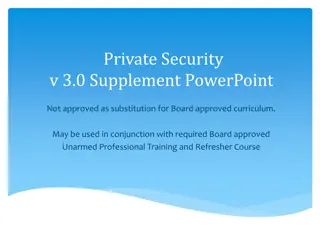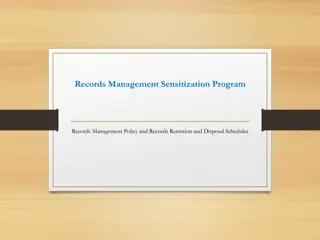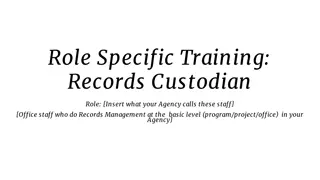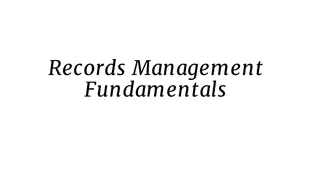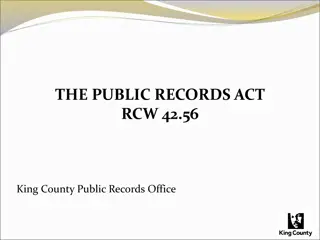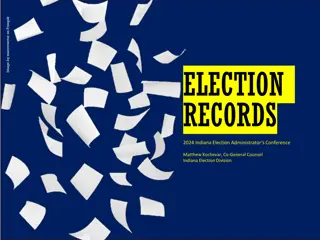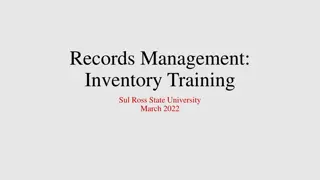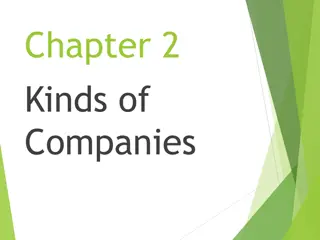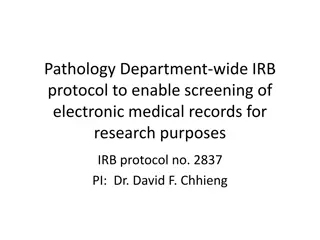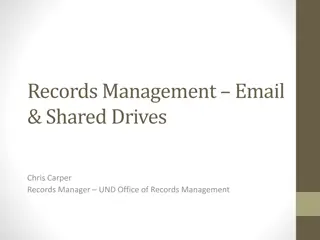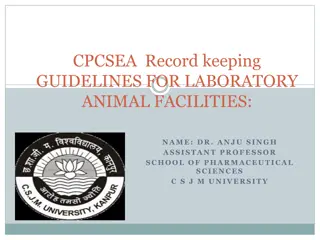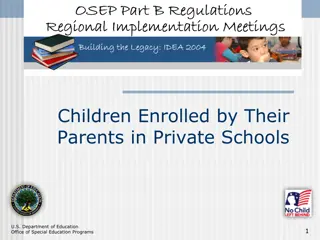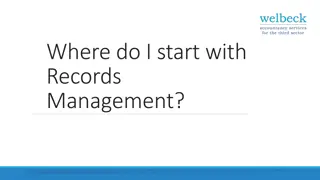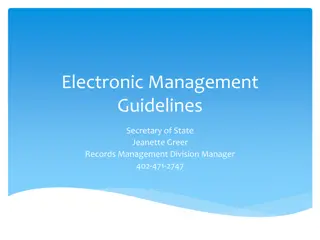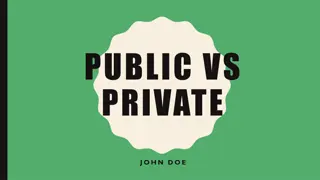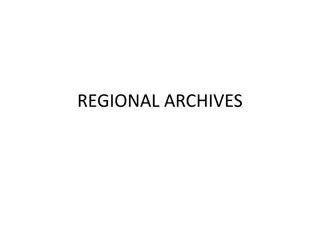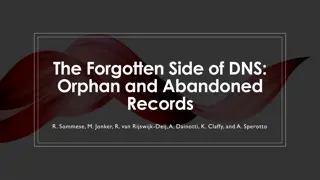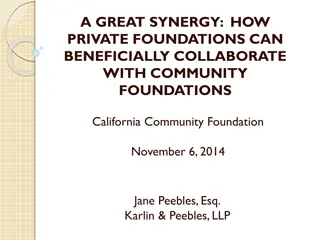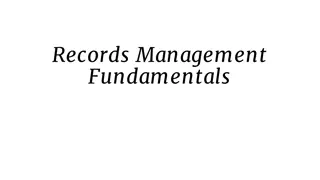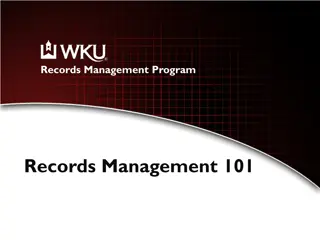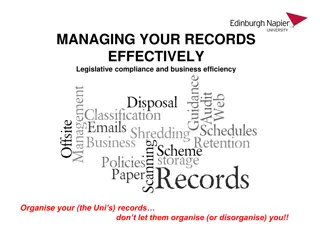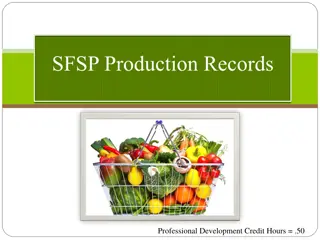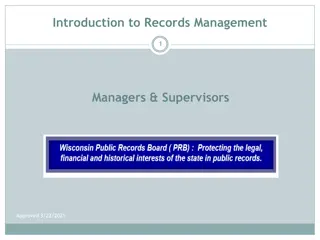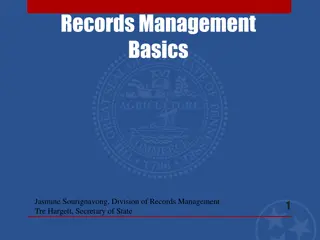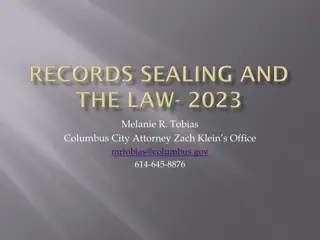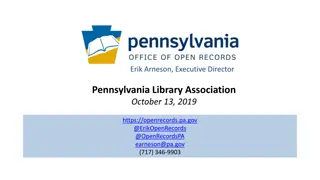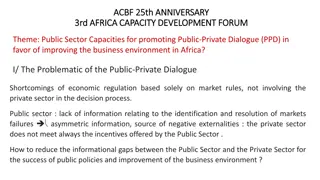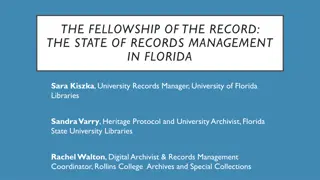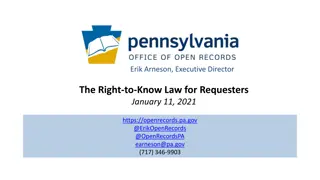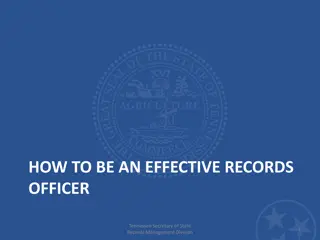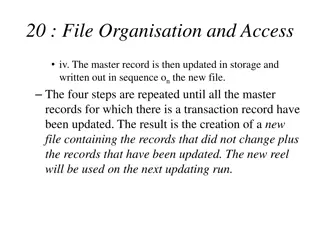NARA’s Regulation for Digitizing Permanent Records
NARA has issued regulations and guidance for digitizing permanent records, including the disposal of original analog records, with the aim of enhancing efficiency and accessibility. The process includes reviewing and updating regulations periodically, transferring metadata when records are transferr
1 views • 20 slides
Methods for Extending Streamflow Records and Their Importance
The presentation outlines methods for extending streamflow records, the reasons behind doing so, and the process of using the results. It includes examples of using data from long-term sites to estimate records at short-term sites. The importance of extending records is highlighted, emphasizing the
1 views • 48 slides
Private Security Training: Law, Regulations, and Civil Liability
Covering a range of essential topics, this training presentation delves into private security regulations, civil law torts, limited authority of private citizens, citizens' arrests, and the role of private security professionals as agents of law enforcement. Understanding these concepts is crucial f
3 views • 36 slides
Everything You Need to Know About Hiring a Private Chef
\"Everything You Need to Know About Hiring a Private Chef\" offers comprehensive insights into the private chef hire process. Discover how to find the perfect chef for your culinary needs, what to expect in terms of services and costs, and tips for ensuring a memorable dining experience. Elevate you
0 views • 9 slides
Comprehensive Records Management Guidelines for COMESA Secretariat
Explore essential aspects of records management for COMESA Secretariat, including sensitization programs, records retention policies, valuable records identification, information sensitivity classification, and vital records preservation. Learn about the importance of maintaining records with admini
7 views • 9 slides
Role-based Training for Records Custodians
Role-based training slides for Records Custodians at your Agency, focusing on managing records at the office level and implementing records management policies and procedures, including applying retention schedules, understanding RM staff structure and policy, coordinating with Records Liaisons, and
0 views • 8 slides
Understanding Records Management Fundamentals for Federal Agencies
This training course outlines the essential responsibilities and procedures for managing federal records. Discover the importance of records management, how to identify federal records, and key resources to support effective records management practices within your agency.
2 views • 63 slides
Understanding the Public Records Act in King County
The Public Records Act in King County emphasizes the people's sovereignty and their right to access governmental records. It defines public records, explains the meaning of writing, and lists various types of records. The content also covers the format of requests and the legal obligations of agenci
1 views • 21 slides
Public Records Regulations in Indiana Elections
Indiana's public records laws dictate that most agency records, including election materials, are publicly accessible. However, certain voter registration and election records have exemptions. The rules cover the availability of records related to voter registration, election administration, and pos
0 views • 12 slides
Effective Records Inventory Management Training at Sul Ross State University
This content presents an overview of records inventory training conducted at Sul Ross State University in March 2022. It covers the importance of records inventory, benefits, step-by-step guidance, identification of non-records, and cataloging procedures for individual and departmental records. The
1 views • 9 slides
Role-Based Training for Records Liaisons
Utilize these slides to develop role-based training for Records Liaisons at your agency, as defined by NARA. Customize the content to suit your agency's specific needs in records management. No approval is required from NARA for customization. The training covers the responsibilities of Records Liai
1 views • 7 slides
Understanding Different Types of Companies in Business
Explore the various kinds of companies in the business world, including statutory companies, registered companies, private companies, public companies, and more. Learn about the differences between private and public companies, statutory company examples like LIC and RBI, and the characteristics of
0 views • 25 slides
Pathology Department IRB Protocol for Electronic Medical Records Screening
Pathology Department's IRB protocol enables the screening of electronic medical records for research purposes, allowing members to review patient records and pathology slides. By fulfilling specific requirements and obtaining blanket IRB approval, researchers can access and analyze patient data for
0 views • 16 slides
Comprehensive Guide to Records Management at UND
Explore the essential aspects of records management at the University of North Dakota (UND), including records retention policy, lifecycle, definition of records, and mediums. Learn about the main objective of the Records Management department, records criteria, what constitutes a record, and what i
0 views • 26 slides
Understanding the Process of Sealing Criminal Records
Sealing criminal records means restricting public access to the records, although they are not destroyed and remain accessible to certain entities. Eligibility requirements vary, and action must be taken to seal records. This presentation covers the process, eligibility criteria, and what to expect
1 views • 36 slides
Guidelines for Recording Keeping in Laboratory Animal Facilities
The Committee for the Purpose of Control and Supervision of Experiments on Animals outlines the importance of maintaining detailed records in laboratory animal facilities to ensure the well-being and proper management of animals used in experiments. Records ranging from animal house plans, staff hea
4 views • 5 slides
Private School Children with Disabilities - U.S. Department of Education Updates
U.S. Department of Education's Office of Special Education Programs has implemented new regulations and key changes regarding children with disabilities enrolled in private schools. The changes include responsibilities of local educational agencies, consent requirements, and clarification on due pro
2 views • 26 slides
The Case for Private Credit Investments in the Global Market
Private credit investments are gaining significance in the global market, offering innovative financing solutions outside traditional avenues like public markets. With a focus on innovation, independence, and integrity, private credit investments cater to diverse sectors such as real estate, natural
1 views • 9 slides
Private Placement of Securities: Overview and Methods to Raise Capital
Private placement of securities involves offering securities to a select group of investors by a company, excluding public offering. This presentation covers the meaning of private placement, provisions of law, methods to raise capital through private placement, and understanding the Private Placeme
3 views • 16 slides
Getting Started with Records Management
Records management is a licensed work under the Creative Commons Attribution-NonCommercial-ShareAlike 4.0 International License. It involves understanding the definitions, purposes, stages, policies, procedures, and tools related to managing records effectively. This comprehensive regime encompasses
1 views • 40 slides
Geospatial Private Sector in Africa: Opportunities and Challenges
The geospatial private sector in Africa faces challenges due to its small and disjointed nature, with a focus mainly on multinational corporations. Initiatives like UN-GGIM are encouraging private sector participation at national and continental levels. Efforts are being made to include the private
0 views • 6 slides
Best Practices for Electronic Records Management
Electronic records management guidelines outlined by Secretary of State Jeanette Greer emphasize the importance of retaining and managing electronic records effectively. Understanding the definition of records, handling cluttered records retention, and managing electronic records properly are crucia
1 views • 19 slides
Understanding Public and Private Spaces and Behaviors
Exploring the concept of public versus private spaces, behaviors, and activities through examples such as public places like restaurants and schools, as well as private places like bedrooms and medical offices. The content also delves into public behaviors like shaking hands and talking to people, c
0 views • 7 slides
History of Regional Archives in India
The National Archives of India established regional offices in important cities like Bhopal, Panaji, Jaipur, and Puducherry to preserve historical records. These regional centers house a variety of collections, including pre-Mutiny and Mutiny Papers, Portuguese Military Records, and French administr
0 views • 7 slides
The Forgotten Side of DNS: Orphan and Abandoned Records
DNS zone administration can be complex, leading to misconfigurations like orphan and abandoned records. Orphan records are former glue records no longer needed, while abandoned records have related domains but are unnecessary. This analysis extends prior research, examining 2K TLDs over 25 months to
0 views • 19 slides
Enhancing Patient-Centered Care Through Improved CMC Records at The Hillingdon Hospitals NHS Foundation Trust
The Hillingdon Hospitals Trust aims to enhance patient-centered care by improving visibility and awareness of CMC (Coordinate My Care) records across generic teams through the development of specific patient information resources, tracking patient attendance at ED with CMC records, and optimizing th
0 views • 11 slides
Private Foundations: Advantages, Benefits, and Collaborations
Explore the benefits of private foundations, including control over grant-making, donor recognition, tax advantages, and collaboration possibilities with community foundations. Understand the differences between private foundations and donor-advised funds, the formation of private family foundations
0 views • 72 slides
Records Management Fundamentals Training Overview
This overview provides insights into a training course on Records Management Fundamentals, designed to educate Agency staff on their responsibilities in managing Federal records. It covers the importance of records management, identification of federal records, fundamental management principles, and
0 views • 63 slides
Effective Records Management Program Overview
Explore the comprehensive Records Management Program at Kentucky State University, covering the creation, maintenance, preservation, and destruction of records. Learn about public records, retention guidelines, record models, and schedules for various university departments. Understand the importanc
0 views • 14 slides
Efficient Records Management for Legislative Compliance and Business Efficiency
Learn how to effectively manage your records to ensure legislative compliance and enhance business efficiency. Discover the importance of aligning records management with strategic objectives and university values. Empower yourself with the knowledge and skills to organize records systematically whi
0 views • 37 slides
Understanding Production Records for Menu Planning in Food Service
This presentation provides valuable insights into the importance of maintaining accurate production records in food service to ensure compliance with meal pattern requirements. It covers topics such as the purpose of production records, who should be involved, where to keep the records, when to fill
0 views • 9 slides
Public Records Management Best Practices
Learn about public records management, including the definition of public records, the importance of records management, the life cycle of a record, why public records management is essential, and your responsibilities in managing public records effectively.
0 views • 19 slides
Understanding Records Management Basics and Regulations
Learn about records management fundamentals, the role of the Public Records Commission, definitions of records, and types of records regardless of format. Understand the importance of managing records properly and the regulations governing access to confidential records.
0 views • 12 slides
Understanding Records Sealing and Expungement in Ohio
Records sealing and expungement in Ohio are processes that allow individuals to have their criminal records either sealed from public view or completely destroyed. These acts are privileges, not rights, and applicants must meet specific criteria to be eligible. Expungement involves the physical dest
0 views • 21 slides
Understanding the Pennsylvania Right-to-Know Law
The Pennsylvania Right-to-Know Law (RTKL) governs access to state and local government records. This law ensures transparency by allowing individuals to request and access records created or held by agencies. The process involves submitting a request, agency response, possible appeal to the Office o
0 views • 24 slides
Enhancing Public-Private Dialogue for Development in Africa
Addressing the shortcomings in public-private dialogue can lead to improved business environments in Africa. The challenges include information gaps, lack of involvement of the private sector in decision-making, and issues with economic regulation. Successful examples like the Cameroon Business Foru
0 views • 5 slides
Challenges and Strategies in Records Management: Insights from Florida Institutions
Explore the state of records management in Florida through insights shared by records professionals from various universities. Discover the expertise levels required, collaboration with Records Management Liaison Officers, interactions with records creators, record transfer processes, outreach initi
0 views • 12 slides
Understanding Right-to-Know Law Basics
The Right-to-Know Law establishes the process for requesting records from state and local agencies. Requesters must seek records, not ask questions, and agencies can grant, deny, or partially fulfill requests. Appeals can be made to the Office of Open Records (OOR) and potentially to court. Records
0 views • 58 slides
Effective Records Officer Guidelines by Tennessee Secretary of State
Learn the essential skills and responsibilities required to be an effective Records Officer/Coordinator in Tennessee as outlined by the Secretary of State Records Management Division. Communication, organization, leadership, collaboration, critical thinking, and decision-making are crucial aspects f
0 views • 17 slides
Sequential File Maintenance and Organisation Process
In sequential file maintenance, the master records are updated and written to a new file in sequence after processing transaction records. This process continues until all relevant master records are updated, resulting in a new file with unchanged and updated records. Additional steps involve file s
0 views • 7 slides


